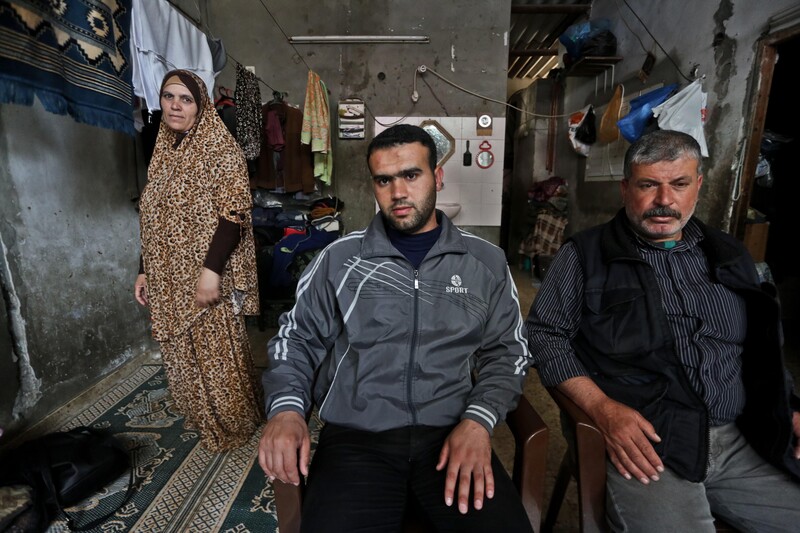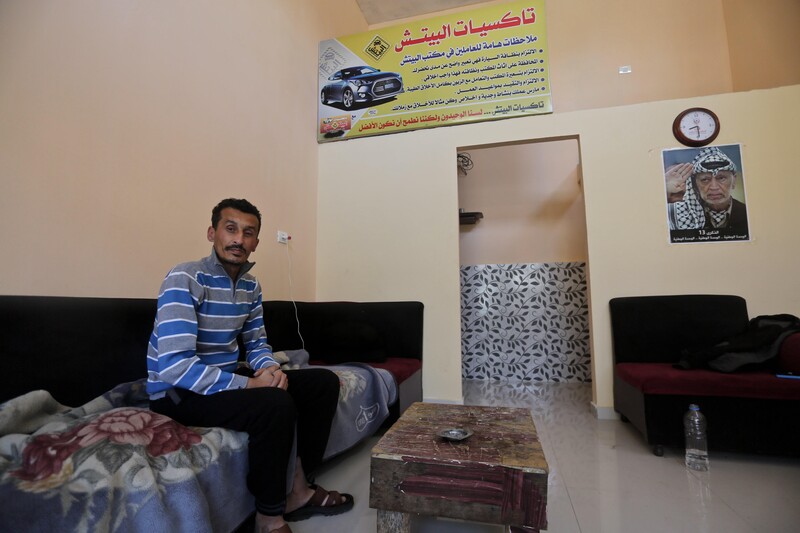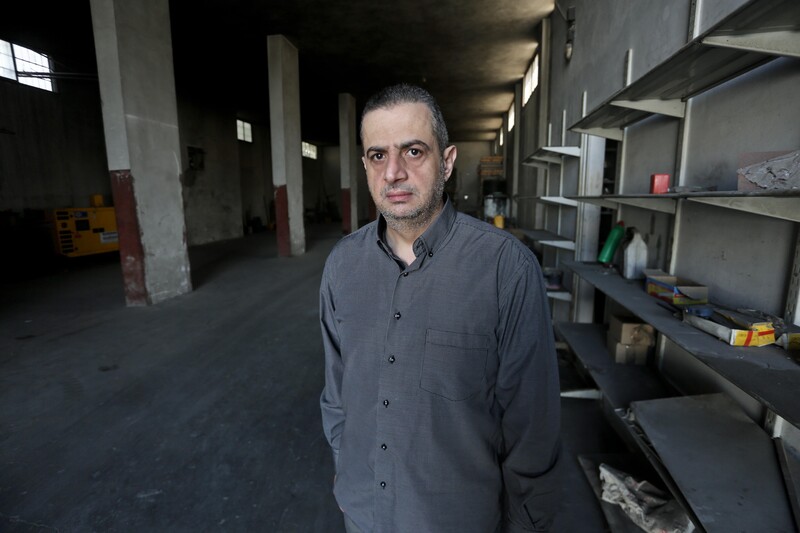The Electronic Intifada 28 March 2018

The Maysara family in their home in Nuseirat refugee camp.
Gaza stands on the brink of full-blown humanitarian disaster.
Unemployment tops 46 percent, with more than 60 percent of those in the 15-29 age group going without work. With precious little progress in rebuilding Gaza’s devastated infrastructure or homes destroyed in three destructive Israeli offensives since 2008, an easing of the blockade is the only slim hope to avoid a full-blown humanitarian crisis that has long been forewarned.
Behind all those numbers are people, most of whom are barely getting by. Family relations are strained, educations go to waste, tempers fray, debts are owed. These are some of their stories.
Sami
Last month, Sami Shamiya, 58, went to his local grocery store in the Nuseirat refugee camp in the central Gaza Strip. There, and on credit, he bought cooking oil and tea for the equivalent of $10. The bill was added to his growing debt at the shop.
He did not take his wares home, however. Instead, he brought them to another shop where he sold the oil and the tea to raise cash for medicine for his wife, Naima, 55, who was unwell with the flu.
Sami’s family of nine lives together in a 120-square-meter dwelling covered by a leaky asbestos roof. There is one room for eating and hosting that also functions as a bedroom for the family’s three sons. Under an old table there, large water buckets contain the clothes of the oldest son, Maysara, 26, a qualified nurse.
Clothes also hang from three ropes tied across a ceiling that leaks when it rains. A rusty, old iron oven holds the family’s shoes. There is no television.
The family’s four daughters sleep in one room. The parents have the last room to themselves, a solitary luxury.
None of the children work. Aged from 15 to 27, three have higher education degrees – Maysara in nursing, older sister Najaa, 27, in social science and younger sister Ala, 25, in teaching – but jobs have proven hard to come by. Not only is Gaza under Israeli siege and suffering the division between Hamas and Fatah, said Maysara, his family has not hitched its colors to any political faction, another route to jobs.
Sami makes a small income as a taxi driver. He doesn’t own the car. In 2007, he suffered spinal cord complications that needed medical care not available in Gaza and for which he had to seek help in Cairo. Local charities helped pay the bill for repeat visits that the family couldn’t have afforded alone.
Indeed, the Shamiyas have to rely on social security from the Palestinian Authority, from which they get benefits amounting to $550 paid out every three months. They also receive food aid once every three months from UNRWA, the UN agency for Palestinian refugees.
Without this, the family would not survive. And together they owe $6,000 for the university educations of three children for jobs that simply don’t exist.
“Sometimes we fight. Sometimes we read the Quran. Mostly, we try to stay steadfast. Without patience, this family would have long vanished,” said Naima. “Look at this house. Does it need explanation?”
Safwat
The last time he lost his temper with his youngest daughter, Safwat al-Susu remembers unhappily, he slapped his 3-year-old daughter for asking for a shekel.
“That was the time I realized how angry I had become,” said the 54-year-old father of seven children, all of whom are still in school.
Previously a tailor, he has long been unemployed. Like every sector, Gaza’s textile industry has been decimated over the past decade of Israeli siege. Complaining of neck pains, Safwat is now looking for any job to help feed his family.
Like Sami, Safwat relies on food aid from UNRWA, delivered every three months, and gets benefits from the PA of $550, also every three months. For clothes and other necessities he has to lean on his brothers or sometimes his wife’s family.
Mostly, he sits at home, a small house in the Maghazi refugee camp in the central Gaza Strip, wondering how to avoid going into unmanageable debt and trying to hide his frustration from his children.
“They don’t understand the situation. They don’t know how hard life in Gaza is getting.”
Sabri
Last November, Sabri al-Maqadma’s wife and four children left home for her parents’ house.
Sabri is in debt. For six months, he was unable to pay rent on his home in the Beach refugee camp in Gaza City. He fell in arrears when a Qatari-funded Islamic charity, suffering the fallout from the Gulf crisis between Saudi Arabia and Qatar, cut a monthly stipend it was paying the taxi driver.

Sabri al-Maqadma in the taxi office where he sleeps.
Even though mediation saw the landlord reduce the debt by half, Sabri, 45, still couldn’t pay. He was forced to leave his home prompting his wife to leave him. Now the owner of the house is pursuing him for $900 in unpaid rent. His estranged wife is demanding he also pay his family another $200 a month for their sustenance.
He had to sell his washing machine, but that only raised $50. He owes his local grocer $200 and ups his tempo, he told The Electronic Intifada, every time he has to pass the shop.
Sabri is angry. He sleeps in the taxi office where he works. He once told a colleague, who had offered him two sandwiches, to buy him poison instead.
“Life is unbearable,” he said. “I don’t know how much longer I can take it.”
Nahed
Nahed Salah al-Amasi, 44, ought to be rushed off his feet. The owner of the largest building materials store in Gaza, his is a trade in demand.
But building materials are only trickling into Gaza due to the Israeli stranglehold on imports and exports and there is no money to rebuild. Rather than oversee a roaring business, Nahed spends most of his time idle in his Gaza City office.
After the 2014 Israeli offensive, Nahed worked closely with the UN to deliver building materials for reconstruction projects. Now, such projects have slowed or ended.

Nahed al-Amasi in his empty warehouse in Gaza City.
Nahed told The Electronic Intifada that since April 2017, the situation has been worse than any time he can remember. Now, he is contemplating laying off the 45 people he employs in his three stores who rely on him for their livelihoods. He has already put them on shift work, half working alternate days.
Nahed is no longer wealthy. His is a family enterprise, and one that his family has been doing for generations. They are not set up to do anything else. And now he is struggling, he said, to pay the university tuition fees for his five children.
“This is the worst situation ever,” Nahed said.
Rami Almeghari is a journalist and university lecturer based in the Gaza Strip.




